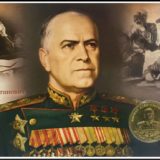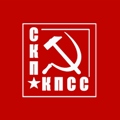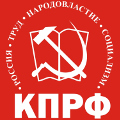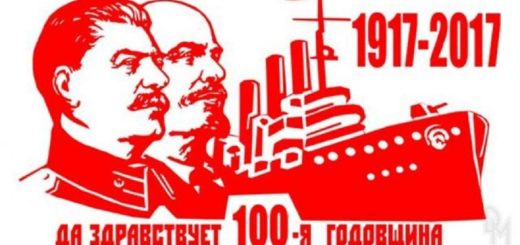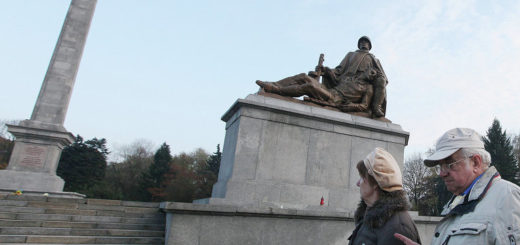Statement by Stanislav Retinsky, Secretary of the Central Committee of the Communist Party of the Donetsk People’s Republic (KPDPR), at a meeting with members of the Central Committee of the German Communist Party (DKP).
The main difference between the events in the Donbas in 2014 and, for example, the current situation in Catalonia is that the struggle for independence of the region was in response to the coup d’état in Kiev. Moreover, at the rallies back in February 2014, the residents of the region spoke not of an independent state, but a federal reorganization of Ukraine. Here the protesters counted on the local authorities as well. When in early March 2014 it turned out that their demands were ignored, the storming of administrative buildings began. One of these ended with success in April of that year. At a congress of representatives of administrative-territorial entities of the Donetsk region, the Donetsk People’s Republic (DPR) was proclaimed.
In a referendum on May 11, Donbas residents voted in favor of the Republic, especially after the massacres in Odessa on May 2 and Mariupol on May 9. Basically, they counted on a repetition of the Crimean scenario, according to which, after the referendum, the Donbas would become part of Russia. True, the Russian leadership was not in a hurry to repeat such a scenario, as confirmed, for example, by Vladimir Putin’s proposal to postpone the date of the referendum. In addition, systematic assistance from the Russian Federation to the Donetsk People’s Republic and the Lugansk People’s Republic (LPR) began to arrive only in August 2014, when the first humanitarian convoy reached Donbas.
Despite the fact that the Eurasian Union headed by Russia is also an alliance of bourgeois countries formed in order to gain a more or less dignified position in the world system of division of labor, integration into the Eurasian Economic Community is preferable for Donbas at this stage, since it does not put obstacles in the way of labor movement. Workers of the Donbas and Ukraine can freely travel to the territory of Russia and work there. That cannot be said of the EU, which not only solves its economic problems through the destruction of Ukrainian industry, but also makes it impossible for Ukrainian migrant workers to move freely in search of work in the EU countries. Even so-called «visa-free travel» is designed primarily for tourist trips.
The events in Donbas involved a wide cross-section of the population, but the main difference from the «Euromaidan» in Kiev was that they were not organized by the oligarchy, which, during the coup d’etat, relied on fascist groups. In the Donbas, the driving force was the petty bourgeoisie, which relied on the proletariat. The workers also participated in the protests, not as a class, but as opponents of the coup in Kiev. Of course, anti-oligarchic slogans were heard in the Donbas. But this protest was not the result of a protest against exploitation as such, but against the fact that the Ukrainian oligarchs supported the «Euromaidan.” Therefore, the Communists of the Donbass from the first days worked among the masses and explained their class interests.
The oligarchy in Ukraine is a typical example of a comprador bourgeoisie, which serves the interests of foreign capital in its country. At the direction of the West, the Ukrainian oligarchs overthrew Viktor Yanukovych, who did not dare to sign an Association Agreement with the EU. It’s not true when they say that if Donbas remained in Ukraine, then it would have been able to save the factories destroyed in the course of military operations. In fact, those who came to power in Kiev in 2014 began to rapidly prepare the Ukrainian market for its absorption by foreign capital. The evidence of this is the current supply of coal from the United States to Ukraine. Independence allowed the DPR and LPR to retain at least part of their industrial potential. Just this year, the Khartsyzsky cable plant and Yuzovskiy metallurgical plant were restored, a power plant was built in the Novoazovskiy district, and new mines were opened in Torez. With its artillery, the Armed Forces of Ukraine (APU) only accelerated what was planned with the transition to European standards, which would have buried most of the enterprises of Donbass. And if there is no industry, there is no proletariat, no subject of history!
Of course, if Viktor Yanukovych had agreed to association with the EU, it is unlikely that Donbas workers would have rebelled against the European standards which are now destroying Ukrainian industry. Throughout the 1990s, workers hardly protested against the closure of enterprises. Obviously, that would have been the case in 2013 if the agreement had been signed. But Viktor Yanukovych retreated at the last moment, because he wanted to get compensation from the «European partners» for the losses to Ukrainian industry under the agreement with the EU. Those who replaced the deposed president were prepared to give up the country’s economy for nothing, without any conditions, in exchange for allowing them to remain in Ukraine as clerks. But the coup d’etat in Kiev worked as a detonator for the Donbas, which, by secession, wanted to protect itself from the lawlessness in Ukraine.
But the massive participation of workers in historical events does not make them proletarian in spirit. In the absence of class consciousness, workers will inevitably play the role of «the left wing of the bourgeoisie.» Recall that in the post-Soviet space the proletariat manifested itself politically about 30 years ago, but in the late 1980s its struggle was directed against Soviet power. For example, miners in Donbas held mass rallies for the alteration of public ownership. And until today the consciousness of the proletariat remains reactionary. Do modern workers understand that they are just a product that is sold on the market along with clothing, cars or necessities? Of course, not. Today most proletarians have a purely bourgeois consciousness, which is manifested not in the struggle against the system, but in the desire to occupy the position of the bourgeoisie.
It is no exaggeration to say that the fate of any socialist revolution depends on the ideological maturity of the proletariat. The indicator of maturity is the existence of class consciousness among the workers, since the proletariat acts when it is conscious of its position. But it can’t develop class consciousness independently. Lenin asserted that, on its own, the working class is able to develop only a trade-union consciousness. As for class consciousness, it can only be introduced from the outside, and its host is a political party. Such an organization did not exist in Donbass in 2014. With the beginning of the rallies, the leadership of the Donetsk Regional Committee of the Communist Party of Ukraine (KPU) not only failed to understand the essence of the historical moment, the need to work with the masses, to explain to the proletariat its class interests, but openly sabotaged the work of ordinary communists. When the coup took place in Kiev, it was the communists who came out first to guard the monument of Lenin in Donetsk, and took an active part in the rallies. In turn, the regional committee of the Communist Party demanded that such activities cease and the party instead prepare for elections in Ukraine. As a result, middle-level communists, heads of city and district committees, decided to take responsibility for the fate of the party in the region.
First Secretary of the Kirov District of the Donetsk Committee of the Communist Party of Ukraine, and now First Secretary of the Central Committee of the KPDPR, Boris Litvinov, is an author of the Act and the Declaration on Independence of the Donetsk People’s Democratic Republic. First Secretary of the Slavyansk City [Donetsk region] Committee of the KPU, and now the Second Secretary of the Central Committee of the KPDPR, Anatoly Khmelevoy, took part in the battle for Slavyansk. With the active participation of the communists, thanks to the presence of party organizations throughout the Donbas, election commissions were set up and a referendum was held on May 11, 2014. More than 20 deputies out of 98 in the Supreme Soviet of the Donetsk People’s Republic were communists.
Events in the Donbas teach us that in an era of social crises, huge masses of people are prepared not only to take action, but even to take up arms. It is another matter that without the revolutionary party, the proletariat will not be able to understand its class interest, correctly articulate its demands, and develop the tactics and strategy for class struggle. All this is the task of the communists. After all, Marxism is the conscious expression of an unconscious process. The task of the Communist Party is to fight for the interests of the working class, even if that class is not yet aware of them. The communists have been working in this direction since the very beginning of the mass protests.
The Declaration of the Donetsk People’s Republic states: «The Republic shall ensure the conditions for the free development and protection of constitutionally recognized forms of property, excluding the appropriation of the results of someone else’s labor, with priority for collective forms.» In other words, the public form of ownership of the means of production was proclaimed. But then in the Constitution of the DPR there was a departure from this principle. It already refers to the protection of private property. Similar things have happened in history. Thus, during the Great French Revolution, Mirabeau first prepared the Declaration of the Rights of Man and the Citizen, where universal equality was proclaimed, and afteward Siyes was already in favor of the introduction of a property qualification for participation in elections.
The communists of the DPR, in turn, are in favor of implementing the points of the Declaration. We are talking, in fact, about the elimination of private property, and it is only the working class, headed by the Communist Party, that can do it. In this sense, the KPDPR has certain similarities with the Communist Party of Portugal. As is well known, the Portuguese Communists are in favor of implementing the provisions of the Constitution where the construction of socialism was proclaimed. It was developed after the victory of the revolution on April 25, 1974, which is also called the Carnation Revolution.
The communists did much to create the Donetsk Republic. Now a significant part of our work is aimed at its international recognition. This can be achieved, in particular, through the establishment of international party relations. The KPDPR has made significant progress in this direction. We are very grateful to the German comrades who render us various kinds of assistance, disseminate our party materials in German, and express solidarity with us. The German Communist Party is one of the first communist parties with which we established bilateral relations. We are proud that we have such supporters in Germany!
Thank you, comrades, for supporting both the Donetsk Communists and the Donetsk People’s Republic. At present, we do not live in the era of the Cold War, when we made a choice between socialism and capitalism. Now we live in an era when we have to choose between U.S. imperialism and all those who resist it. In the Donbas, the most bitter resistance to the military aggression of the pro-American regime, established in Kiev as a result of the coup, is going on. Of course, not only supporters of the left, but also of right-wing views, are fighting on the side of the DPR and the LPR. This was already the case in the post-Soviet space. In his last interview, Donetsk communist Vsevolod Petrovsky, my friend and comrade who died in the battle for Debaltsevo, noted that in 1993, not only leftists but also right-wing forces rebelled against Yeltsin’s lawlessness. Was this a reason for the communists to stop resistance? Of course not.
Even if socialist principles were proclaimed in the Donbas, but were not finally approved, we communists consider it necessary to defend the Republic at this stage. After taking a blow from Ukraine, the EU and the U.S., we are helping to strengthen socialism in other regions of the world, in particular, Latin America and Southeast Asia. To overthrow world imperialism, Che Guevara called for the creation of «many Vietnams» in the 1960s. We, the communists of the DPR, are talking about the need to create «many Donbases.» Each act of solidarity with the Donbass is a new center of resistance. This is the essence of internationalism.

